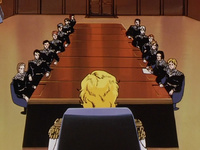Oskar von Reuenthal
From Gineipaedia, the Legend of Galactic Heroes wiki
 Fleet Admiral Reuenthal (800 UC (2 NIC / 491 IC / 3600 CE)) | |
| Gender: | Male |
| Affiliation: | Galactic Empire |
| Rank: | Fleet Admiral |
| Flagship(s): | Tristan Morholt (former) |
| Occupation: | Chief of High Command Office Governor-General of Neue Land |
| Status: | Deceased (combat injuries) |
| Born: | 26 October 767 UC (458 IC / 3567 CE) |
| Died: | 16 December 800 UC (2 NIC / 491 IC / 3600 CE) |
| Children: | Felix Mittermeyer (biological) |
| Other relative(s): | Elfriede von Kohlrausch (child's mother) |
| Played by: | Wakamoto Norio |
Oskar von Reuenthal (Japanese: オスカー・フォン・ロイエンタール) was an Imperial Fleet Admiral who served as the Chief of High Command Office, Governor-General of the former Alliance territory, and was one of the "Twin Pillars" of Kaiser Reinhard's Goldenlöwe Dynasty. Nicknamed the "Bewitching Eyes" for his heterochromatic eyes, Reuenthal was a brilliant commander and was considered to be second only to Reinhard in terms of strategic ability. He was the closest friend of fellow Fleet Admiral Wolfgang Mittermeyer, the Space Fleet Commander and the other one of the Twin Pillars of the Goldenlöwe Dynasty. The two of them were some of Reinhard von Lohengramm's earliest supporters against the Goldenbaum Dynasty and high nobles ruling the first Empire. However, after complex scheming by various interests behind the scenes, Reuenthal decided to rise in rebellion against his Kaiser, only to fall in battle.
Fleet Admiral Reuenthal had been regarded as one of the five best tacticians of that era, and also proved himself to be a capable administrator as the Governor-General of the occupied Alliance territories.
Contents |
Biography
Early life and service
Oskar von Reuenthal was born in 767 UC (458 IC / 3567 CE), to a couple of lower nobility, similarly to Reinhard von Müsel. His father had chosen to get married at age forty after stabilising his finances, to the third daughter of Count Marbach. The Marbach family by then had been in a poor financial state, so she married him in order to obtain his wealth. However, rumours that she was having an affair with a younger man persisted, and when their child Oskar was born, he had one brown and one blue eye, even though both husband and wife had blue eyes. His mother then tried to gouge out one of his eyes with a knife, as it was evidence of her affair, but was stopped by a servant who entered the room at that moment. She ended up committing suicide while Reuenthal's father drowned himself with alcohol, becoming distant and not caring about his son. Ever since that incident in his infancy, Reuenthal remained bitter towards women. He would only reveal this story to his friend Mittermeyer. (LOGH: 'Portraits')
At some point, Reuenthal joined the Imperial Fleet and became an officer, ending up meeting Wolfgang Mittermeyer at a bar when they were both sub-lieutenants, in 789 UC (480 IC / 3589 CE). They both helped some lower ranking ratings who were being picked on by the Imperial Military Police, fighting alongside each other in a bar fight with the MPs, and had been close friends ever since. Reuenthal later attended his best friend's wedding with Evangelin in 792 UC (483 IC / 3592 CE). (LOGH: 'Portraits')
By May 794 UC (485 IC / 3594 CE), shortly after the Battle of Van-Fleet, Oskar von Reuenthal was a captain in the Imperial Fleet (along with Mittermeyer), and the two of them had seen Reinhard von Lohengramm (then von Müsel) and Siegfried Kircheis for the first time, in the Ministry of War on Odin. Reinhard, who was eighteen at the time and just promoted to rear admiral, was said by Reuenthal to have been "a baby tiger mistaken for a house cat," in response to a comparison made by Mittermeyer. He believed that Reinhard was so successful due to his own abilities, as the enemy was under no obligation to lose just because Reinhard's sister was favoured by Kaiser Friedrich IV. By December 794 UC (485 IC / 3594 CE), Reuenthal had been promoted to the rank of commodore and fought in the Sixth Battle of Iserlohn as a squadron commander, where his and Mittermeyer's calm and capable leadership was credited with preventing a total rout of the Imperial fleet. (LOGH: 'Lost Things', HBSHBL: 'Chronicle of the Aftermath of the Chaotic War', 'A Hundred Billion Stars, One Ambition')
On 2 May 795 UC (486 IC / 3595 CE), then-Rear Admiral Reuenthal swore allegiance to Admiral Reinhard von Müsel in exchange for his help in freeing Mittermeyer from prison, when the latter was detained after having executed an aristocratic subordinate for a crime (which was taken as a slight since he was a commoner). After that, Reinhard and Kircheis went to the prison along with Reuenthal, freeing Mittermeyer from the high nobles who had him extra-judicially arrested. Despite his subsequent loyalty to Reinhard, Reuenthal sometimes harboured thoughts of seizing even more power for himself, thoughts that would eventually lead to his downfall. Somewhat of a womaniser, he despises the idea of settling down or having any children because his mother attempted to kill him when he was an infant because of his heterochromatic eyes. (LOGH: 'Farewell, Distant Memories', 'Portraits', 'Rolling Thunder', 'Premonition of a Storm', 'In the Name of Pride')
Late Goldenbaum era

By the winter of 795 UC (486 IC / 3595 CE), Reuenthal and Mittermeyer were rear admirals serving at Iserlohn Fortress. Although they were Reinhard von Lohengramm's fleet commanders and staff officers, they were ordered by the Naval Command to remain behind during the operation to invade the Astarte Starzone of the Free Planets Alliance, which High Admiral Lohengramm was ordered to carry out, and were temporarily replaced with other officers with whom Reinhard had not worked with. It was part of a set up by the high nobles, led by Duke Otto von Braunschweig, to have Reinhard killed or fall from grace. Reuenthal thus stayed at Iserlohn Fortress for the duration of what would become the Battle of Astarte, in January 796 UC (487 IC / 3596 CE). However, much to Reuenthal's approval and the chagrin of the nobles, the blond admiral managed to pull off a victory against three numerically superior Alliance fleets regardless. (Overture to a New War)
With Reinhard's success in the operation and his resulting promotion to fleet admiral, he established his own admiralty, and in it were several young, up and coming vice admirals, with Reuenthal being among them. They mostly consisted of those who had a lower nobility or commoner background. During those early days Reuenthal, Mittermeyer, and the rest of them assisted their commander however they could, most notably by helping Kircheis free Reinhard's sister Annerose from the hands of a certain vengeful noblewoman. However, they collectively did not get to make major accomplishments until the Alliance captured Iserlohn Fortress later that same year and began an attempted invasion of the Empire. When the Alliance's large expeditionary force occupied several Imperial regions and its supply lines were stretched to the limit, Imperial raids caused a shortage of supplies among the Free Planets Star Fleet's front line units. Thus, the overextended and under-supplied Alliance invasion force at the height of its fatigued was overwhelmed by the Imperial Navy. The Reuenthal Fleet confronted Admiral Alexandre Bewcock's 5th Fleet during the Imperial counteroffensive. Although Bucock was prepared to withdraw to Iserlohn beforehand due to their untenable situation in the Imperial territory, he nonetheless sustained 30% losses from Vice Admiral Reuenthal's pursuit. (LOGH: 'The Castrop Rebellion', 'The Actress Exits', 'The Battle of Amritsar Starzone')

With the successful defence of the Empire, Reuenthal received a promotion to full admiral around the late fall of 796 UC (487 IC / 3596 CE). However, shortly after the Alliance invasion was repulsed, Emperor Friedrich IV died of a heart attack. The lack of a clear heir-apparent soon began a power struggle in the Imperial aristocracy. Reinhard was willing to work with the late Kaiser's Minister of State, Klaus von Lichtenlade, to place the young Erwin Josef II on the throne, as he did not have influential parents like the other candidates and thus would be easy to control. The situation quickly deteriorated as the Empire was split into two camps, one defending the traditional order of the Goldenbaum Dynasty, led by the highborn aristocrats, while the other sought power for itself, led by Reinhard and Klaus von Lichtenlade. This began an important chapter in Reuenthal's personal life. During the night of the Lohengramm–Lichtenlade "mini coup" against the high nobles on Odin, Reuenthal, incidentally, protected acting Imperial prime minister Lichtenlade's mansion. It was not the last time that Reuenthal would have dealings with the Lichtenlade clan. (LOGH: 'New Trends', 'The Lippstadt Conspiracy')
Lippstadt War and aftermath
As the Imperial Civil War began between the nobles' faction, the Lippstadt League, and the Imperial government of Emperor Erwin Josef II, Reinhard was appointed Supreme Commander of the Imperial Fleet, while Reuenthal and Mittermeyer served as his top fleet commanders after Kircheis, the Vice Commander-in-Chief. Reuenthal–promoted to full admiral, along with Mittermeyer–fought in a number of engagements during the Lippstadt campaign, including the fight for Rentenburg Fortress, the battle for the Schann-tau Starzone against Admiral Willibald Joachim von Merkatz, and the final siege of the Lippstadt headquarters, Geiersburg Fortress. Due to the incompetence and arrogance of the high nobles, they were ultimately defeated despite having a much larger fleet and resources. When Kircheis was assassinated in the aftermath of the last battle, and Reinhard was distraught, Reuenthal suggested they needed to do something to fix their young ruler's demoralized state. Reuenthal later stated that he somewhat regretted saying that, but it seemed right at the time. (LOGH: 'Bloodshed in Space', 'Courage and Loyalty', 'The Fall of Goldenbaum', 'Determination and Ambition')
It became apparent that Lichtenlade harboured plans to move against them, and so a force led by Mittermeyer and Reuenthal returned to Odin from Geiersburg around that time to carry out a coup against the acting Imperial head of government. While Mittermeyer secured the Imperial Seal at the Prime Minister's official residence, Reuenthal ended up being the one to directly arrest Lichtenlade in his mansion, and as a result the man ended up being forced to commit suicide after being accused of plotting to overthrow Fleet Admiral von Lohengramm. The fact that Reuenthal was the one who detained Lichtenlade and carried out the punishment of his family on Reinhard's behalf would have consequences for him later. Meanwhile, as a result of this action, Reinhard became the new Prime Minister while simultaneously being the Supreme Commander of the Imperial Fleet, making him the de facto dictator of the Empire, as the reigning Kaiser was only seven years old. With the beginning of reforms under Prime Minister Duke von Lohengramm, it was also seen as the end of the Goldenbaum Dynasty (although it had not yet been formally deposed, as the seven-year old Erwin Josef II continued to reign in name) and the feudalistic social structure that it enforced. (LOGH: 'Farewell, Distant Memories', 'First Battle')
Operation Ragnarök

With the establishment of Reinhard von Lohengramm's uncontested rule, Oskar von Reuenthal began to question his allegiance to his lord. In a conversation shortly after the coup, Reinhard mentioned in a conversation about the fate of the Lichtenlade family that if Reuenthal felt that he could overthrow him too, he was welcome to try. In the early months of 798 UC (489 IC / 3598 CE), when the force under Admiral Karl Gustav Kempff failed to use the mobilised Geiersburg Fortress to take over or destroy the Alliance-held Iserlohn, Reuenthal harboured the opinion that Reinhard viewed his top admirals as pawns that could be discarded when needed. His friend Mittermeyer disagreed and warned him to be careful of what he said, believing that if the faithfully functioned as Reinhard's arms and legs then they would get their due reward. Following the kidnapping of Emperor Erwin Josef by Fezzani-supported Lippstadt veterans in the summer of 798, Reuenthal expressed distaste at the idea proposed by Reinhard to use the Fezzan Corridor to attack the Alliance, where the young Kaiser's kidnappers found refuge and established a "legitimate" Goldenbaum government-in-exile. Reuenthal did not trust the scheming Fezzani enough to use their formerly demilitarised space to attack the Alliance, although Reinhard ultimately decided that it was the main plan and that the risks were nonetheless preferable to "piling up corpses" in the Iserlohn Corridor, especially after Kempff's failure earlier that spring. (LOGH: 'Farewell, Distant Memories', 'Determination and Ambition', 'The Abduction of the Young Emperor', 'Operation: Ragnarök')
When the Operation began Reuenthal initially commanded the forces that were sent to besiege Iserlohn and divert attention from the main thrust of the Imperial invasion. Reuenthal put up a battle against the defenders of Iserlohn for sometime, mainly limiting his efforts to "nuisance raids" after an initial offensive resulted in the Alliance Rosen Ritter infantry regiment getting aboard Reuenthal's flagship. The Imperial high admiral fought in hand-to-hand combat against the Alliance commander Walter von Schönkopf until the two were interrupted by arriving troops. Meanwhile, a larger force under High Admiral Mittermeyer entered the Fezzan Corridor and occupied the planet itself. The fall of Fezzan came as a shock to the Alliance government, and the Empire successful made its way into Alliance space from the Corridor. At that point, Reuenthal allowed Yang Wen-li's Iserlohn Garrison Fleet to evacuate Iserlohn, becoming known for capturing the fortress. (LOGH: 'The Sounding of Gjallarhorn', 'Fezzan Occupied', 'Admiral Yang's Ark Fleet')
Following that, Reuenthal arrived in Alliance space to meet up with the main Imperial force, leaving Cornelius Lutz behind as Iserlohn commander. Failing to track down Yang's remaining force and eliminate it, the Imperial command decided to lure them out into an open battle an annihilate them. As part of this strategy, the Reuenthal Fleet and most of the others were deployed to occupy other sectors, leaving Reinhard alone for Yang to be lured out. However, the Battle of Vermilion did not proceed exactly as planed, and Reuenthal was convinced by Mittermeyer and Reinhard's aide, Hildegard von Mariendorf, to go straight to Heinessen and force the Alliance government to surrender and order Yang to stand down. Reuenthal initially noted what an opportunity it was, but decided to go along with Mittermeyer's plan, easing the tension around this proposal among all involved regarding the subject of Reuenthal's loyalty. That was why Mariendorf had gone to Mittermeyer rather than Reuenthal. The Alliance government quickly surrendered after some threats (Heinessen was undefended), which Reuenthal noted that they were "unexpectedly spineless." Yang was ordered to stand down, an order he obeyed. (LOGH: 'Battle After Battle', 'The Battle of Vermilion (Part One)', 'The Battle of Vermilion (Part Two)', 'Sudden Change')
Shortly after that, Reuenthal was present with the other admirals at Reinhard's coronation as Kaiser. (LOGH: 'After the Ceremony, the Curtain Rises Again...')
Reinhard's reign
After Reinhard's coronation, Reuenthal was appointed as Chief of the High Command Office with the rank of Fleet Admiral, and would continue to hold this office during the next six months until shortly after the Second Alliance–Imperial War, when he served as Reinhard's chief of staff aboard the Brünhild. He ended up entering into a relationship with Elfriede von Kohlrausch, niece of the former Prime Minister Klaus von Lichtenlade, who initially tried to murder him for the death of Lichtenlade and the downfall of her family. Reuenthal then secretly harboured her in his house, only telling Mittermeyer. Although she at one point told him he should rebel against Kaiser Reinhard, Reuenthal told her he would because he was not capable enough. The woman eventually becomes pregnant with Reuenthal's child. When he humiliated secret police chief Heydrich Lang at a high-level meeting, Lang decided to get revenge by accusing Reuenthal of treason and looking for evidence of it. In the end he made a deal with the Fezzani leader who was in hiding since the Imperial invasion of Fezzan, Adrian Rubinsky, and was able to bring a treason case against Reuenthal to the Imperial justice minister Bruckdorf. This caused a disruption in the Fleet and many officers believed that it was an attack on Reuenthal by Paul von Oberstein. This result in a short investigation, and in the end, Kaiser Reinhard decided that Reuenthal was innocent due to his long allegiance to him, and appointed him to the post of Governor-General of the former Alliance worlds, which after the Battle of the Corridor left Reuenthal in effective control of half the Imperial Fleet and civil administration over a large portion of the New Galactic Empire. (LOGH: 'Visitors', 'Holiday's End', 'Ragnarök Again', 'The Battle of Marr-Adetta Starzone (Part One)', 'Rolling Thunder', 'Eve of the Festival')
Insurrection

Late in 800 UC (2 NIC / 491 IC / 3600 CE) a regicide attempt on Reinhard was made on the planet Uruvasi while he was en route to make a state visit to Heinessen. Rumours had been spread by Heydrich Lang that the visit was arranged by Reuenthal in order to make Reinhard vulnerable to capture, as the beginning of a rebellion. While this was not the case, the continuing adversarial relationship between Reuenthal and Oberstein made the former unwilling to approach Reinhard to explain how the attack had been made by soldiers supposed to be under his command. Rather than compromising his pride, Reuenthal decided that if he was going to be blamed for the treasonous attack then he would be a traitor in truth and broke from the Imperial Government, claiming that Oberstein and Lang were usurping power from Reinhard. Thus, his friend Mittermeyer was ordered by the Kaiser to lead a fleet in restoring order to the Neue Land, against Reuenthal. Although he was emotionally torn over this issue, Mittermeyer follows orders, attempting to reason with his friend to stop what he is doing. Reuenthal, however, proposes Mittermeyer to join his cause, and for the two to rule as Senior Emperor and Junior Emperor, dividing the Empire in two; with Mittermeyer naturally rejecting it as simply bloodthirsty dreams. Meanwhile, on Heinessen, Reuenthal secured the cooperation of admirals Alfred Grillparzer and Bruno von Knappstein in the coming revolt. Although Reuenthal also sent Murai to the republicans at Iserlohn Fortress offering them the Alliance territory in exchange for them not letting the Empire use the Corridor to launch a two-front attack against him, they refused. (LOGH: 'The Urvashi Incident', 'In the Name of Pride', 'Rebellion Is a Hero's Privilege', 'The Two Great Ones Strike at Each Other!')
In a clash of fleets, Reuenthal's forces were unable to attain victory over the combined Imperial fleet, and he ultimately ordered a retreat to Heinessen after a week of battle. Bruno von Knappstein was killed in combat and his fleet was destroyed, while the one under Alfred Grillparzer betrayed Reuenthal prior to a second engagement with Mittermeyer's forces, damaging Reuenthal's flagship Tristan, leading to him being impaled by a shard of metal. He declined surgery in order to remain in command and was able to maintain an organised withdrawal of many of his units in the face of Mittermeyer's swift advance. Other portions of his fleet surrendered or were destroyed covering his retreat. When he returned to the administrative centre of the Neue Land, only about 10% of his fleet remained intact. (LOGH: 'Live by the Sword...', 'Die by the Sword')
Returning to Heinessen with the awareness that his injuries were fatal, Reuenthal placed his affairs in order, handing the administration of his civil duties to subordinates who had not followed him in his uprising and taking the time to execute Job Trunicht. He was unexpectedly visited by Kohlrausch who he instructed to give their son to his friend Mittermeyer before offering her the chance to kill him rather than simply to watch him die, although she departed rather than taking either option. Although he tried to live long enough for Mittermeyer to arrive for a final farewell, Oskar von Reuenthal passed away on 16 December while dictating a letter. (LOGH: 'Endless Requiem')
Around the same time the battle was taking place, an investigation by Ernest Mecklinger reveals that Grillparzer—who had earlier investigated the Uruvasi incident—concealed evidence of Terraist cult involvement in the regicide attempt on Reinhard, and ordered Grillparzer's arrest. Heydrich Lang also confessed to his dealings with Adrian Rubinsky to Ulrich Kesler's Military Police, and his part to incite this whole affair with Reuenthal in order to weaken the Kaiser's power. Lang, and quite likely Grillparzer as well, were executed for treason. (LOGH: 'Die by the Sword', 'Endless Requiem')
Personal life

Reuenthal was born with heterochromia, a condition that left his left eye blue, and right eye brown. Both of Reuenthal's parents shared blue eyes, so this was observed as proof of his mother's adultery: because of this Reuenthal's mother attempted to murder him when he was still just an infant. Caught in the act, his mother then took her own life. His father blamed Reuenthal for the loss of his wife and took to drinking and treating Reuenthal with heavy disdain. This trauma led Reuenthal to avoid the idea of settling down, or having any children.
Despite his loyalty to Reinhard, Reuenthal sometimes harbours thoughts of seizing even more power for himself, thoughts which eventually lead to his downfall.
Appendices
Appearances
- My Conquest Is the Sea of Stars (first appearance)
- Overture to a New War
- LOGH:
- 'In the Eternal Night'
- 'The Castrop Rebellion'
- 'Cool, Clear Artificial Eyes'
- 'The Actress Exits'
- 'When the Rain of Grief Comes...'
- 'Liberation of the Frontier Zone'
- 'The Battle of Amritsar Starzone'
- 'New Trends'
- 'The Lippstadt Conspiracy'
- 'Bloodshed in Space'
- 'Courage and Loyalty'
- 'The Fall of Goldenbaum'
- 'The Day Before Destiny'
- 'Farewell, Distant Memories'
- 'First Battle'
- 'Portraits'
- 'Lost Things'
- 'The Return'
- 'Determination and Ambition'
- 'The Abduction of the Young Emperor'
- 'The Arrow Is Released'
- 'Operation: Ragnarök'
- 'Invitation to a Requiem'
- 'The Sounding of Gjallarhorn'
- 'Admiral Yang's Ark Fleet'
- 'The Darkness Before Dawn'
- 'Battle After Battle'
- 'Sudden Change'
- 'Long Live the Emperor!'
- 'After the Ceremony, the Curtain Rises Again...'
- 'Live by the Sword...'
- 'Die by the Sword'
- 'Endless Requiem' (death)
- 'The Golden Lion Flag Loses Its Lustre' (dream)
- HBSHBL:
- 'Chronicle of the Aftermath of the Chaotic War'
- 'A Hundred Billion Stars, One Ambition' (final appearance)
Name variations
- Oskar von Reuental (LD subtitles)
Memorable quotes
- "Regardless of the colour of eyes or skin the colour of blood is the same for everyone,isn't it?"
- "I don't think 'screaming in pain in place of his superior' is among an adjutant's duties."
- "....For humans, there is an appropriate life, as well as an appropriate death."
Background information
Full-Reuenthal is a municipality in Switzerland. Reuen also means "regret" in German, which could be a possible allusion to Reuenthal's own tragic life.
Tristan connection
The name of Reuenthal's flagship, the Tristan, is a reference to the character of the same name from the tale of Tristan and Isolde. It is interesting to note that the stories of Tristan and Reuenthal, although not exactly alike, have numerous similarities that would seem to suggest an intentional connection between the two:
- Both characters fall in love with a resentful woman whose loved one(s) they have been responsible for killing — in Tristan's case, he has killed Isolde's fiancé; whilst in Reuenthal's case he was responsible for the arrest and likely killing of Elfriede's great-uncle, Klaus von Lichtenlade, and his family.
- Both characters betray their benefactor — in Tristan's case, King Marke; and in Reuenthal's case, Kaiser Reinhard.
- Both characters are forced to fight a dear and loyal friend — in Tristan's case, Melot; and in Reuenthal's case, Wolfgang Mittermeyer.
- Both characters are mortally wounded in said fight.
- Both characters are returned to their 'castle' by a subordinate after being wounded.
- Both characters are visited by the woman they love just before they die.
Apocrypha
Stage

Reuenthal is played by Higashiyama Yoshihisa in the 2011 stage adaptation of LOGH.
